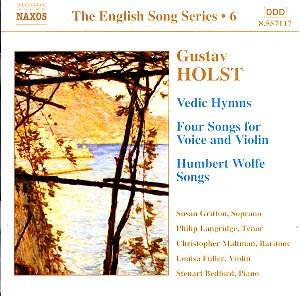This splendidly generous Holst anthology representatively
samples his song output: 33 of his 72 solo songs. The selection
touches on the major themes that shape his oeuvre. The Four
Songs address medievalism (as did his Helen Waddell operatic
setting, The Wandering Scholar). The Vedic Hymns link
with his oriental/Sanskrit leanings as seen in Beni Mora,
Savitri, Indra and Sita. The Wolfe Songs
are almost sui generis although echoing The Hymn of Jesus,
the more mystical aspects of The Planets and Egdon Heath.
The pure-toned and hoot-free Gritton tackles
the brief, austere Medieval Songs inspired by Holst
hearing his pupil Christine Ratcliffe singing and accompanying
herself in Thaxted Church. The third song is 'I sing of a maiden',
a text popularly set by British composers in the 1910s and 1920s.
Did these inspire his friend Vaughan Williams to use the same
forces for his neglected Housman cycle Along the Field?
Gritton continues with the Six Songs straight from
the mainstream English song tradition unbowed by commercial balladry.
The poets set include Philip Sidney, Tennyson, Blake and Breton.
The Tennyson song (Calm is the morn) is admirably peaceful.
The Ibsen Cradle Song (tr.32) could just as easily
have been part of this set. It comes as no surprise to learn that
the pristine singing of Susan Gritton features on one of the many
versions of Gorecki's Symphony of Sorrowful Songs (Tring
TRP084). I am sure she would make a very strong contender if ever
she records Barber's Knoxville.
The nine Vedic Hymns are sung by
Christopher Maltman who deals with them knowingly and with great
sympathy. The galloping Maruts (tr.13) contrasts with the
unearthly enchantment and often breath-taking stillness (tr.19)
of the rest of the set. This very calming quality also infuses
The Heart's Worship whose harmonic tang more than
once looks towards that of his friend Vaughan Williams (tr.33).
The Vedic songs are indeed hymns, invocational, praising; only
the bizarrely descriptive Song of the Frogs (tr.16) breaks
the mould. The tremor (as in tr.14 on the words 'Lords of the
Sky') in Maltman's voice casts a shadow from time to time although
he manages the not inconsiderable breath control demands of the
last song on the disc with seeming mastery.
The Wolfe Songs are souvenirs of
the 1920s and of the fame of the poetry of Humbert Wolfe. It had
something to do with the mystique of the time, of contact with
the Beyond, of Madame Blavatsky, of desperate attempts by the
bereaved to contact those killed during the Great War. These songs
undismayed by sentimentality, are infused with peace, a fey stillness,
musical references, the glittering piano figuration, the lyrical
vocal line, predominantly the absence of dissonance (although
it does put in an appearance in The thought (tr.24)) and
the inhuman mysteries of Betelgeuse. Betelgeuse
might almost belong as a pendant to The Planets but nowhere
in that work does Holst deal with such unflinching remoteness
and desolation of emotion. Wolfe's language is a development of
Flecker's refulgently allusional poetry. The wonder is that, as
far as I know, with the exception of Frank Bridge's setting of
Journey's End, only Holst set these poems. Both Michael
Head (still awaiting his own CD Edition) and Gerald Finzi
should have found these poems very apt material. Wolfe's slim
volumes, now battered and age-worn, can still be found on the
shelves of secondhand booksellers. Philip Langridge is very good
in these songs. A version with orchestration by Colin Matthews,
under the title The Dream City, is available on Hyperion
Helios. Apart from that I am sure that there was at one time an
Argo LP of them perhaps sung by Pears.
Steuart Bedford, a Britten protégé
and one of the pillars of Aldeburgh is completely at ease in this
repertoire and, more to the point, gives every appearance of caring
for it. Holst's music was often in evidence at Aldeburgh so his
presence comes as no surprise.
In common with the other five Naxos ex-Collins
volumes full texts are given. There are no translations - English
only. Keith Anderson's note covers the essentials as well as surprising
this reader when he tells us that Holst conducted three Boston
Symphony concerts and during the same U.S. visit met his actor
brother, Emil, known there as Ernest Cossart!
How many more volumes are there to come? I know
that there is at least one more; a Gurney collection. Perhaps
there were others unissued before Collins fell under the axe.
Having pulled off the coup of getting licences
to issue the Collins English Song series Naxos should now look
at negotiating for the complete Lyrita catalogue. The chances
of that happening are probably comparable with the chances of
Regis licensing the Conifer CDs of Handley conducting the nine
Malcolm Arnold symphonies. As Harry Hill might have said "Now,
what are the chances of that?"
Collins knew what they were about with this collection.
There is still no competition. Not even close. If you are at all
interested in Holst or English song this is as attractive a buy
as you are ever going to get. Don't delay ... buy today.
Rob Barnett
